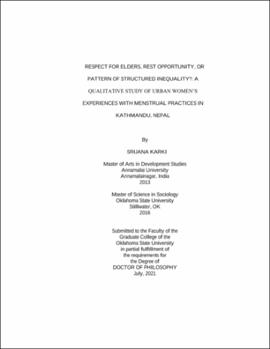| dc.contributor.advisor | Mix, Tamara | |
| dc.contributor.author | Karki, Srijana | |
| dc.date.accessioned | 2022-01-21T19:19:51Z | |
| dc.date.available | 2022-01-21T19:19:51Z | |
| dc.date.issued | 2021-07 | |
| dc.identifier.uri | https://hdl.handle.net/11244/333756 | |
| dc.description.abstract | Women in Nepal, follow numerous menstrual practices. Past studies have focused on menstrual practices followed in rural areas, particularly emphasizing health and sanitation. Using 71 semi-structured interviews with women above the age of 18, this study provides a nuanced understanding of menstrual practices in the urban capital of Kathmandu, Nepal. I employ Gender Structure Theory to examine the relevance of menstrual practices at the individual, interactional, and institutional levels. A clear spectrum of adherence to menstrual practices emerged based on the interview responses. The identified groups are labeled "adherents" who strictly follow menstrual practices, "aspirants" who aspire to follow if someone would shoulder their domestic responsibilities, "negotiators" who engage or defy when beneficial to them, and "opponents" who openly oppose menstrual restrictions. At the individual level, respondents included in the study follow a diverse range of practices. Adherents and aspirants argue that they have internalized menstrual practices. Negotiators view menstrual practices as a respite from domestic chores, and opponents view menstrual rules as a way to dominate women. Interactional level analysis illustrates how conformity and resistance to menstrual practices allow women to do and undo gender. Adherents mostly followed menstrual practices to maintain their image as a virtuous Nepali woman, as their adherence allows them to maintain purity and show respect to elders. Negotiators and opponents consistently resist the practices, actively engaging in undoing gender. Institutional level analysis examines Nepali families to illustrate the ways transfer of menstrual customs within families enables an understanding of the structure of power and authority in Nepali society. The stringent menstrual rules followed for ancestral rituals and practices around initiated high-caste men reflect their high statuses in Nepali society. Additionally, some respondents compare menstrual customs to caste-based discrimination, showing lower statuses held by women and lower caste groups. The present study provides a detailed analysis of women's experiences with contemporary menstrual customs, highlighting the diversity of existing practices in Nepal. Women are agents who actively engage to navigate, modify, and reinterpret menstrual practices. The present study is significant in outlining how women create agreeable practices within concrete constraints, also highlighting men's role in the continuance of menstrual expectations. | |
| dc.format | application/pdf | |
| dc.language | en_US | |
| dc.rights | Copyright is held by the author who has granted the Oklahoma State University Library the non-exclusive right to share this material in its institutional repository. Contact Digital Library Services at lib-dls@okstate.edu or 405-744-9161 for the permission policy on the use, reproduction or distribution of this material. | |
| dc.title | Respect for elders, rest opportunity, or pattern of structured inequality?: A qualitative study of urban women's experiences with menstrual practices in Kathmandu, Nepal | |
| dc.contributor.committeeMember | McLaughlin, Heather | |
| dc.contributor.committeeMember | Perkins, Stephen | |
| dc.contributor.committeeMember | Sheehan, Rebecca | |
| osu.filename | KARKI_okstate_0664D_17287.pdf | |
| osu.accesstype | Open Access | |
| dc.type.genre | Dissertation | |
| dc.type.material | Text | |
| dc.subject.keywords | agency | |
| dc.subject.keywords | gender structure theory | |
| dc.subject.keywords | global south | |
| dc.subject.keywords | menstrual customs | |
| dc.subject.keywords | nepal | |
| dc.subject.keywords | women | |
| thesis.degree.discipline | Sociology | |
| thesis.degree.grantor | Oklahoma State University | |
